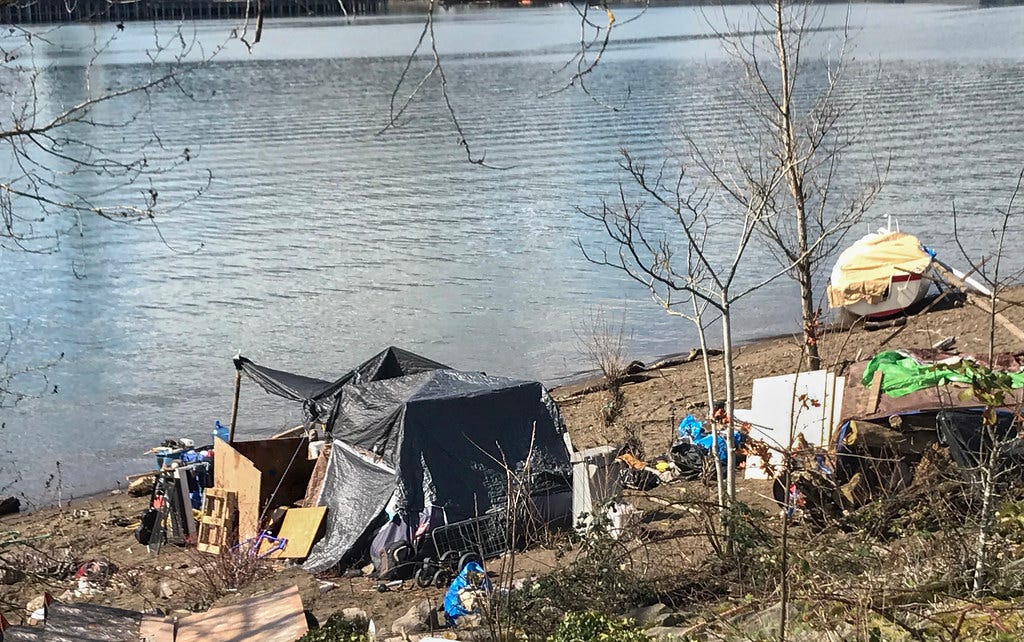Jared Wiener on Homelessness #GovernorGoals
The next governor and other public officials should focus on a critical component of the crisis and prioritize progress on that front.
EDITOR’S NOTE: This piece is a part of our #GovernorGoals series. Learn more about it here. Send your goals on one of the selected topics to theway@or360.org for potential publication.
I am not a housing expert but you don’t need that credential to realize the severity of homelessness in our community. And, with a problem of this magnitude, it’s important for more than just experts to think about solutions. I work at the intersection of the process-oriented public sector and the speed of our innovation economy. I’m bringing a bit of both perspectives to this topic.
Given that this is part of the Way’s #GovernorGoals series, hopefully this article provides the next governor (as well as the general public) with a new framework for homelessness. A framework that galvanizes policymakers and community leaders, and provides affordable housing and homeless support service professionals with the tools and financial resources to make systemic change.
Let’s start with a couple doses of reality. First, our current approach is not acceptable. Our cities are not designed to effectively accommodate street camping yet it is occurring at dramatic levels. The folks in that situation, the tenants and homeowners affected by it, and the surrounding community living all deserve a better outcome than this status quo. To better understand my perspective, I wrote about this in the context of respect in October. Here’s an excerpt:
Overcoming the status quo will require bold leadership and concessions by all involved. And, it must entail a more humane solution for the most marginalized. One where they trust a life off the street is a better outcome. This challenge was not created overnight and it will not be solved that way.
Second, we cannot solve homelessness in the short-term. I wish we could but like so many ills facing our communities it is a dynamic challenge embedded into society’s fabric. We should continue working on it and Steve Novick’s December piece (among many others in The Way) includes sound solutions.
Nevertheless, the next governor and other public officials should focus on a critical component of the crisis and prioritize progress on that front. One thing the COVID pandemic has taught us is that incredible things can be accomplished in a short period of time. The first vaccine went into a nurse’s arm in New York on December 14, 2020, just 11 months after the first reported case in the country. One year since that first shot more than 490 million shots have been administered in the country. Unfortunately, COVID is still part of everyday life, but the ability of society to function is vastly better and the number of deaths significantly less than they would be without prioritizing vaccinations.
This is how we should approach homelessness - address the most pressing challenge. This focus and a bold goal will catalyze others. In innovation speak we need a Big Hairy Audacious Goal (B-HAG), as coined by Jim Collins and Jerry Porras in their book, “Built to Last.” When it comes to homelessness, my B-HAG is to humanely end tent camping in Oregon cities by January 1, 2023.
To be successful this will have to be a top priority. For instance, I was recently working with a company looking to hire more folks in downtown Portland. They were concerned with homelessness and the perception of safety concerns in the neighborhood. They were looking for city resources to reduce this concern by financing on-site parking. If we had accommodated their request (we did not), it would have diverted public resources away from the core problem and perpetuated the status quo. We cannot achieve a B-HAG by reducing the visibility of the problem, we have to consistently devote the limited resources available towards the established goal.
To achieve results we must accept imperfect solutions that are universally better than street camping. This is a simple equation for the next governor to use: does policy/action “X” increase or reduce tent camping in Oregon cities? If yes, is there another policy/action “Y” that will do it better? This equation will lead and, when implemented, already has led to significant compromise. For instance, converting the use of Wapato Jail into the Bybee Lakes Hope Center to support homeless individuals applied this equation and made the community better off.
We are too often blinded by the possible because of the current state we are in. No one could have imagined the pandemic hitting and the changes that have resulted. The same is true of the internet in the 1990s. How would you describe to someone in 1991 how you received and are reading this post? Society is too accepting of homelessness and the personal and societal cost of it. This is a status quo that is in need of disruption - a disruption that offers greater alternatives to those most impacted, and makes our urban communities better for it. Make no mistake, not taking transformational action is a choice, and that choice is continued acceptance of the current state. That’s why the next governor should identify a B-HAG and push us toward it.
Jared writes about society reopening, the positive side of technology and doing better. When not writing, he works on creating growth & opportunity in Portland Tech.
Related pieces:
photo credit: "Trumpville on the Willamette" by A.Davey is licensed under CC BY-NC-ND 2.0





